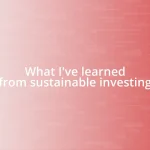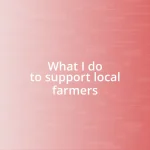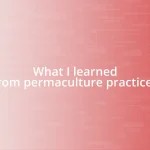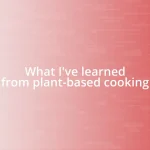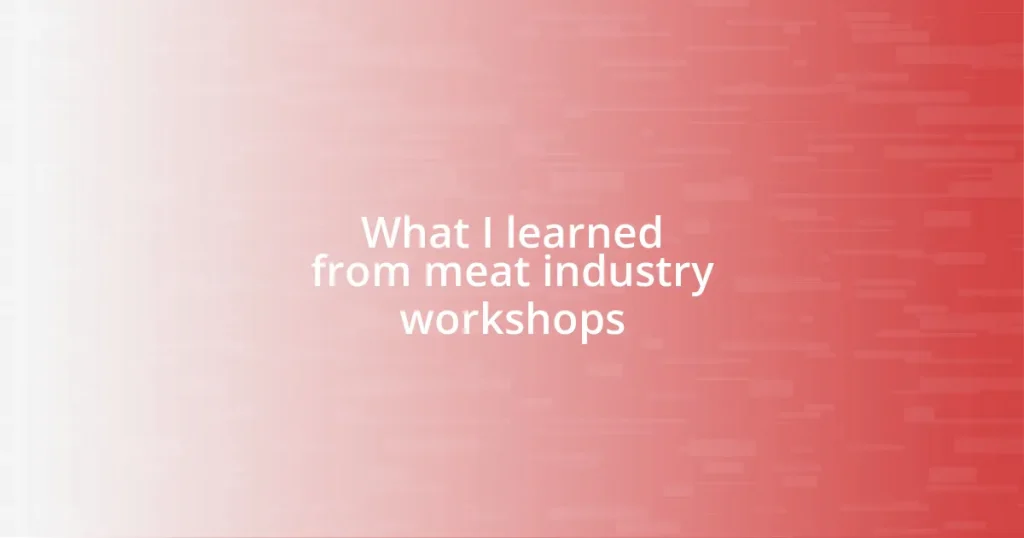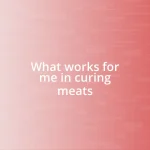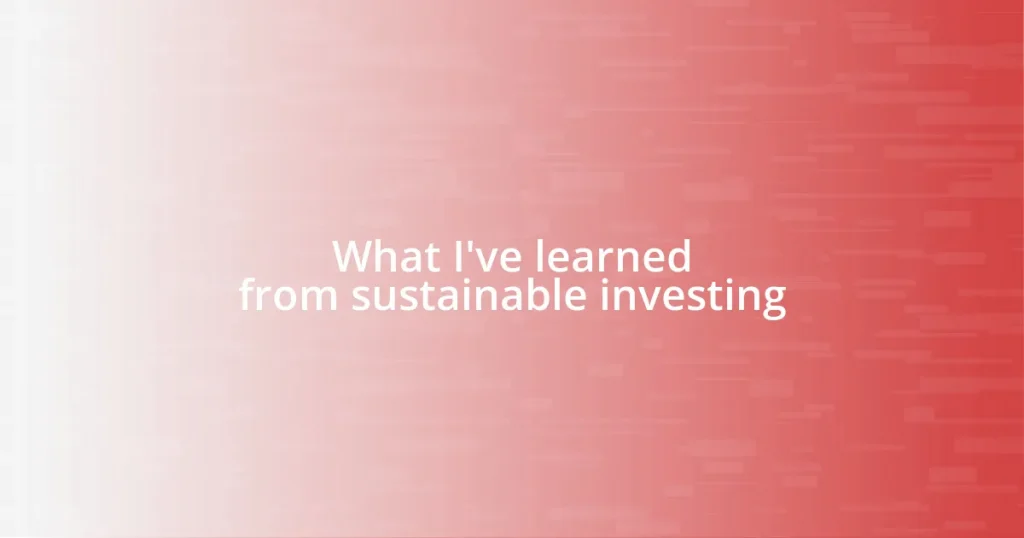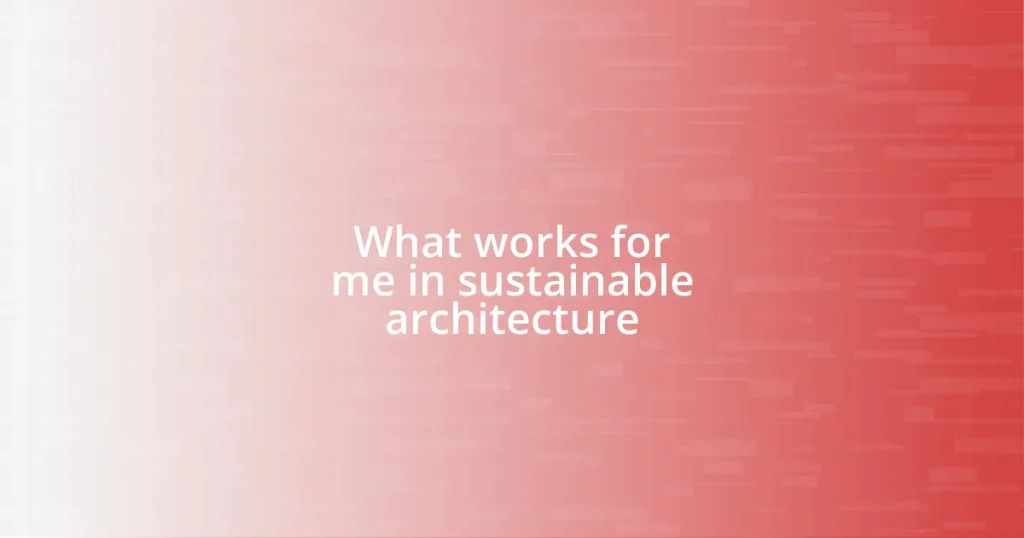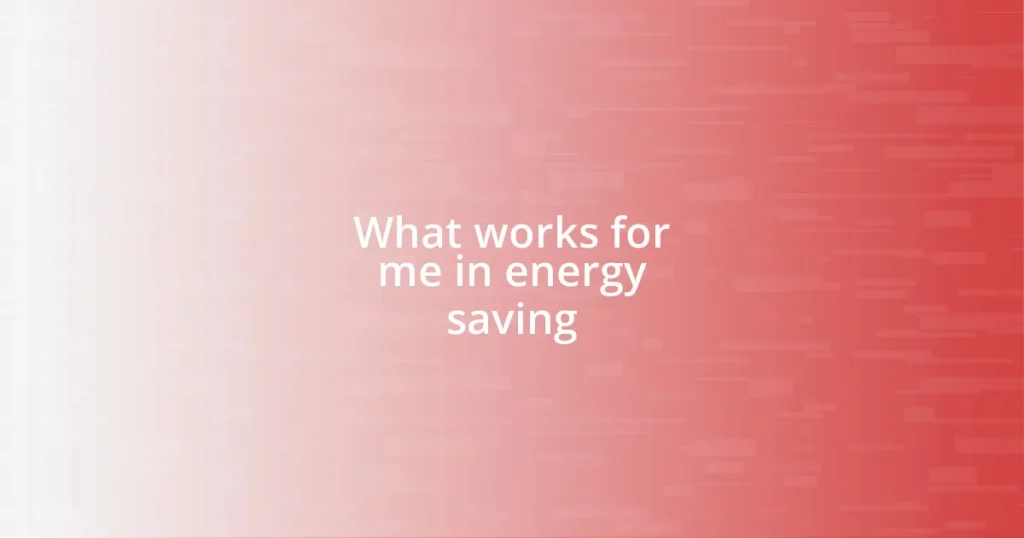Key takeaways:
- Workshops foster knowledge exchange and collaboration, encouraging innovative practices in meat production.
- Key skills developed include effective communication, adaptability in crisis situations, and leveraging data analysis for informed decision-making.
- Insights gained highlight the importance of animal welfare, sustainability, and transparency in the supply chain for enhancing meat quality and consumer trust.
- Networking builds valuable relationships, leading to mentorship and collaboration on sustainability initiatives within the industry.
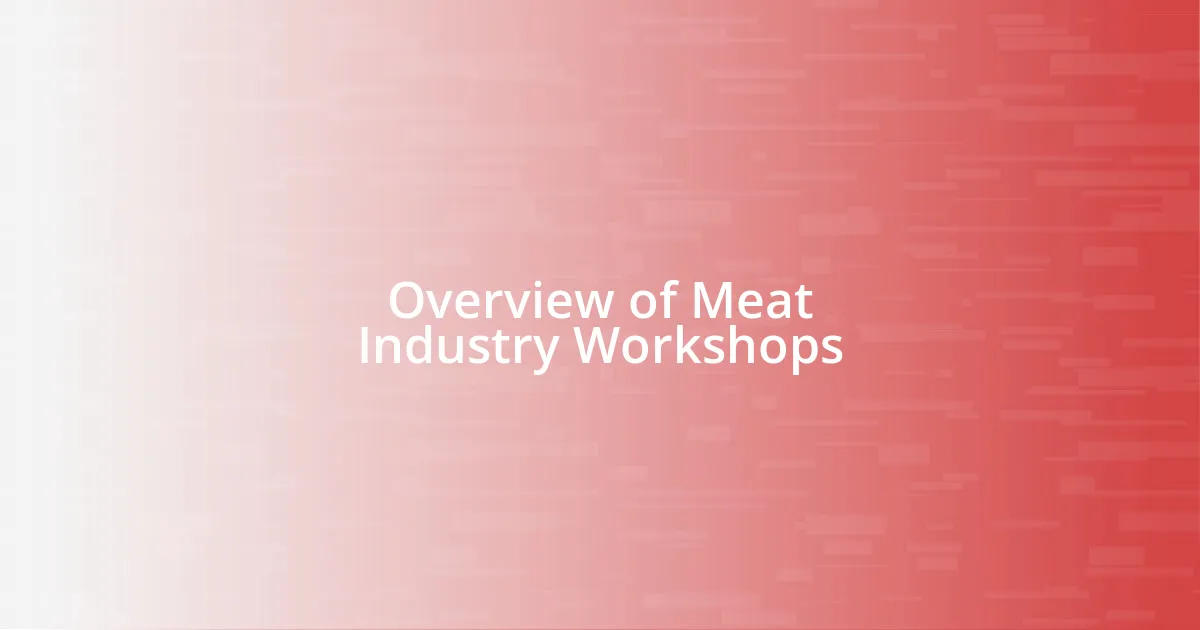
Overview of Meat Industry Workshops
Meat industry workshops serve as a hub for knowledge exchange among professionals, from farmers to processors. I remember stepping into my first workshop, feeling a mix of excitement and trepidation. It was eye-opening to see how diverse the participants were, each bringing a unique perspective shaped by their experiences. The camaraderie was palpable, sparking conversations that delved deep into topics like humane handling practices and sustainability initiatives.
Attending these workshops is not just about learning current industry trends; it’s also about forging connections that can lead to innovative solutions in meat production. I’ll never forget a session where an expert shared a breakthrough in waste management that significantly reduced environmental impact. That moment made me realize that sharing knowledge could spark change, inspiring others to adopt better practices.
In my experience, these workshops also highlight the emotional dimension of our work. I often find myself reflecting on the responsibility we have as meat industry professionals to balance efficiency with ethics. How can we ensure we’re not just producing more but producing better? These workshops challenge us to think critically and foster a community committed to continuous improvement.
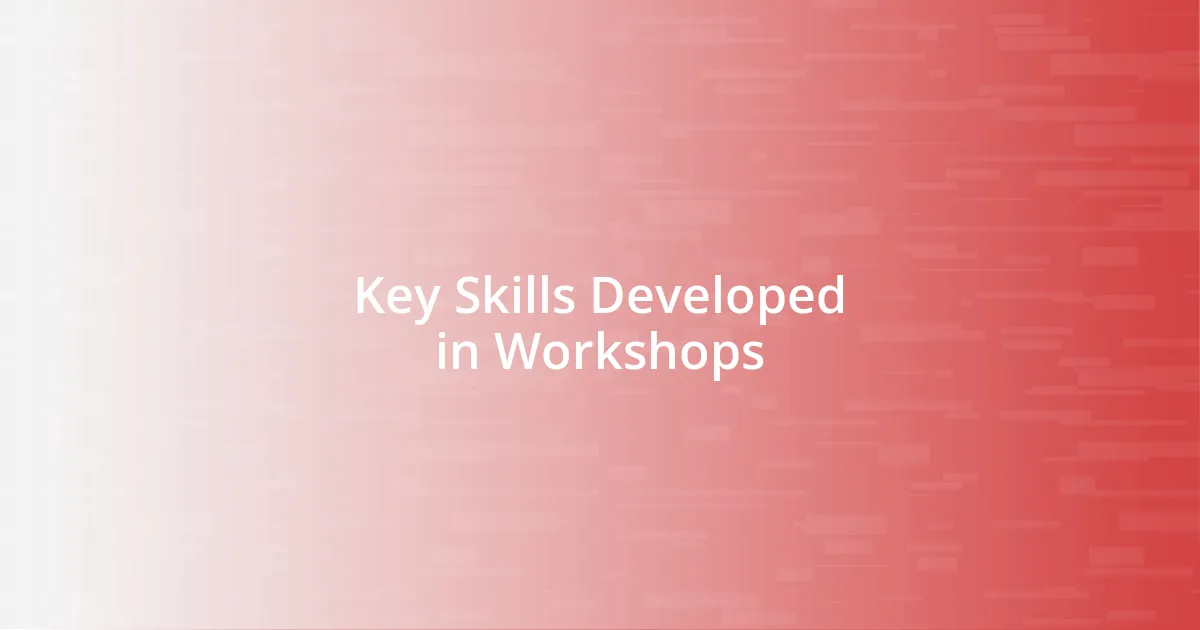
Key Skills Developed in Workshops
Attending meat industry workshops has allowed me to develop essential skills that are crucial for success in this field. For instance, I vividly recall a session focused on effective communication strategies. It was a realization for me; communicating technical information in a way that’s easily understood is a game changer. This skill not only enhances collaboration but also builds trust with clients and colleagues alike.
Another key skill I picked up is the importance of adaptability. Workshops often present unexpected scenarios or case studies, pushing us out of our comfort zones. I remember a particularly intense role-playing exercise where we had to address a crisis in a meat processing plant. It was stressful, but it taught me how to think on my feet—an invaluable skill when facing real-world challenges.
Lastly, the emphasis on data analysis really reshaped my approach to decision-making. During one workshop, we tackled the role of technology in monitoring food safety. The hands-on experience with data visualization tools allowed me to see trends and make informed decisions swiftly. It was eye-opening to grasp how data can drive smarter practices in our industry.
| Skill | Description |
|---|---|
| Effective Communication | Overcoming technical jargon to build trust and collaboration. |
| Adaptability | Learning to think quickly in high-pressure scenarios. |
| Data Analysis | Harnessing technology to make informed decisions in food safety. |
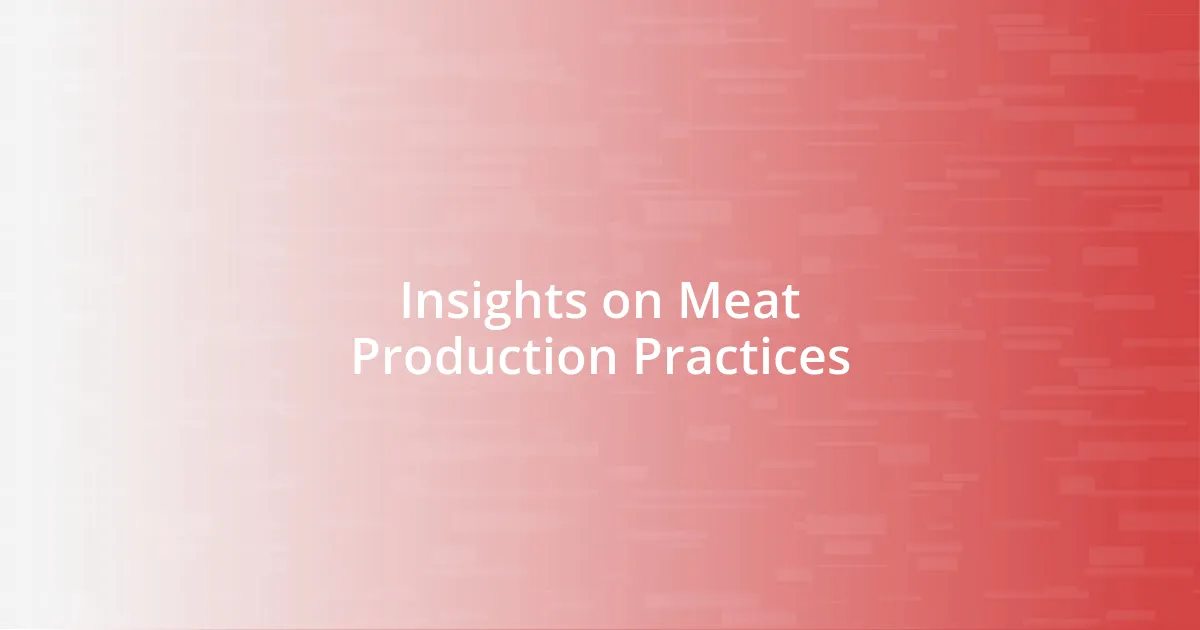
Insights on Meat Production Practices
I gained profound insights into meat production practices during the workshops that have shaped my perspective significantly. One particular session tackled animal welfare, emphasizing the correlation between humane treatment and meat quality. This revelation hit home for me; seeing the direct impact of emotional and physical well-being on livestock made me re-evaluate my own practices. It’s a delicate balance to strike, and understanding that our decisions in the processing stage have ripple effects throughout the entire supply chain has been pivotal.
- Sustainable Practices: Workshops revealed innovative methods for reducing waste and optimizing resources.
- Traceability: I learned the critical importance of knowing where our meat comes from, impacting both consumer trust and safety.
- Technology Integration: The introduction of advancements, such as RFID tagging for livestock, excited me, showing how tech can enhance efficiency without sacrificing quality.
- Quality Control: I observed firsthand the rigorous standards needed to ensure product safety and consistency. The emphasis on proactive measures rather than reactive fixes was particularly enlightening.
Reflecting on these elements has deepened my respect for the industry and the responsibilities we carry. Each discussion brought a mix of excitement and gravity, as I realized that each choice we make echoes far beyond our immediate needs.
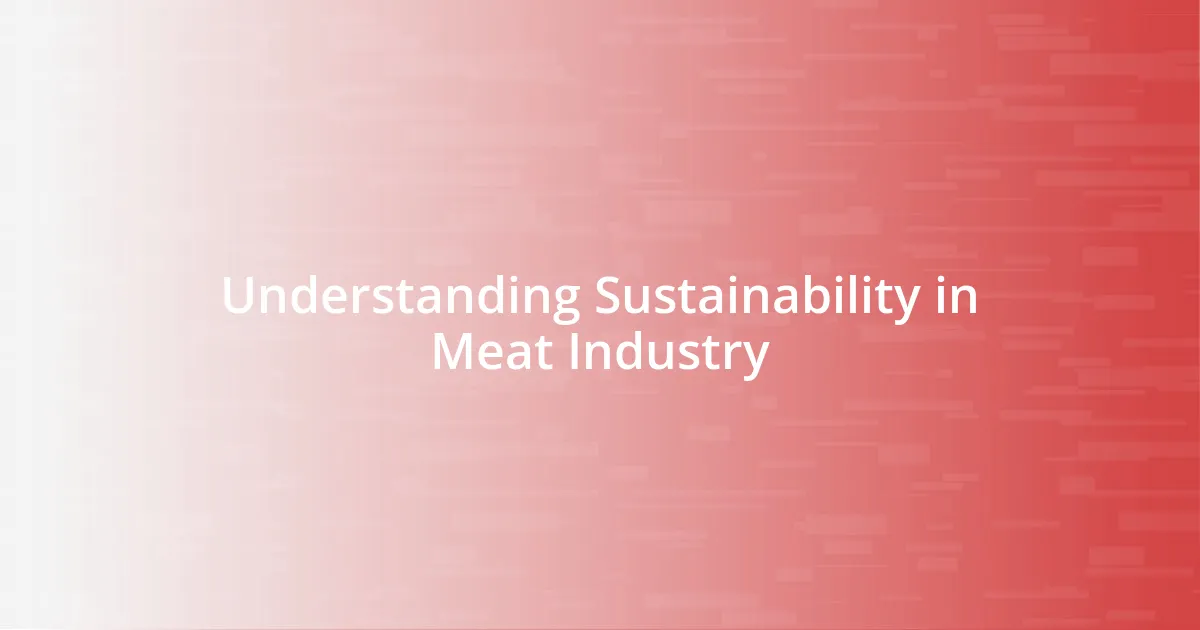
Understanding Sustainability in Meat Industry
Sustainability in the meat industry is a multifaceted topic that really struck a chord with me during the workshops. I recall a session where we delved into sustainable grazing practices; it was astonishing to see how rotational grazing not only improves soil health but can also enhance meat quality. It made me wonder—how often do we consider the environmental impact of our farming methods? This holistic approach really shifted my perspective, pushing me to think about the long-term implications of every choice.
Another enlightening moment was discussing water usage in meat production. Learning that the industry is one of the largest consumers of water made me reflect on my own practices. I remember during a hands-on workshop, we explored ways to minimize water waste, from more efficient irrigation systems to better cleaning processes in processing plants. It was eye-opening! I left feeling empowered with practical strategies to contribute positively, rather than sitting back and accepting the status quo.
Lastly, the emphasis on transparency in the supply chain captivated me. I still think about a powerful presentation detailing how many consumers today want to know where their food comes from. The connection between transparency and consumer trust is undeniable. It prompted me to ask myself—am I doing enough to ensure that my practices reflect a commitment to sustainability? Workshops like these don’t just educate; they inspire critical self-reflection on how we can all play a part in building a more sustainable future.
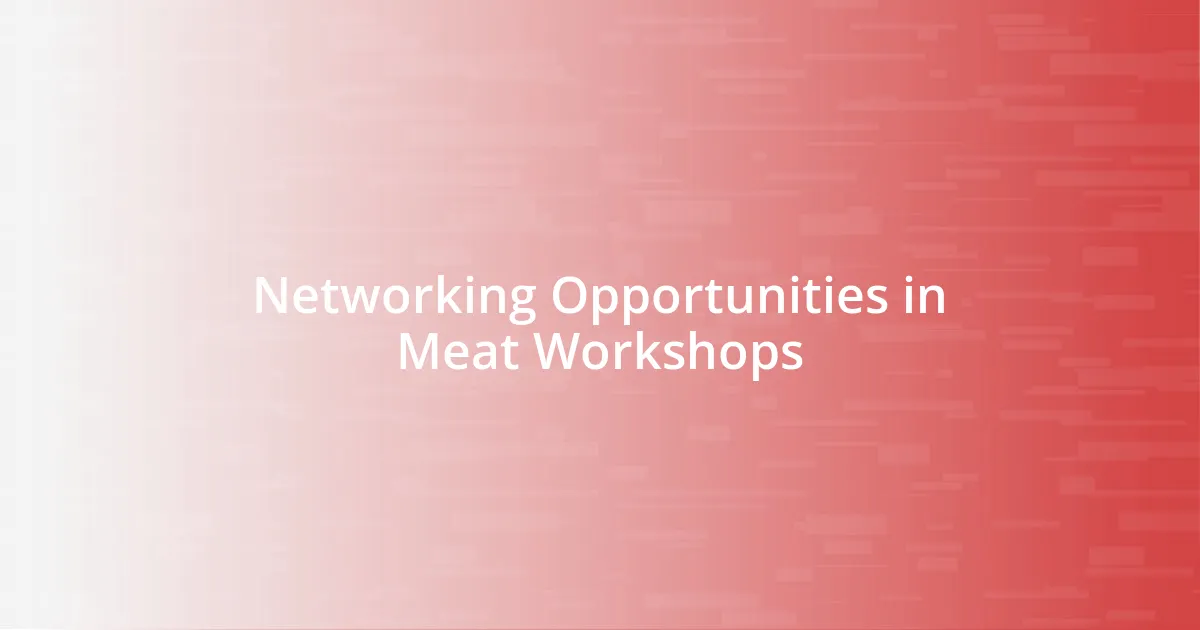
Networking Opportunities in Meat Workshops
Networking at meat industry workshops offers an invaluable opportunity to connect with professionals who share a passion for the field. I recall a moment during a break in one workshop when I struck up a casual conversation with a fellow participant. We discussed not only our favorite practices but also our shared struggles in the industry. That connection turned into a mentorship that has proven invaluable, and it made me realize just how much we can learn from each other.
As I navigated through various sessions, I met individuals from diverse sectors, including producers, processors, and researchers. Each conversation opened up new ideas and potential collaborations I never considered before. I remember exchanging contact information with someone who introduced me to a groundbreaking water recycling technique used in meat processing. We now share insights regularly, which has not only broadened my network but has also enriched my understanding of sustainable practices.
It often surprises me how organically these networking opportunities arise. One night, after a workshop session, I found myself at a dinner table surrounded by industry veterans. They willingly shared their experiences, challenges, and even failures. Have you ever found the most profound lessons come from others’ missteps? I certainly did that evening, as their stories sparked ideas I could apply directly to my own work. The relationships forged in these workshops often extend beyond mere introductions; they cultivate lasting partnerships that empower us all.
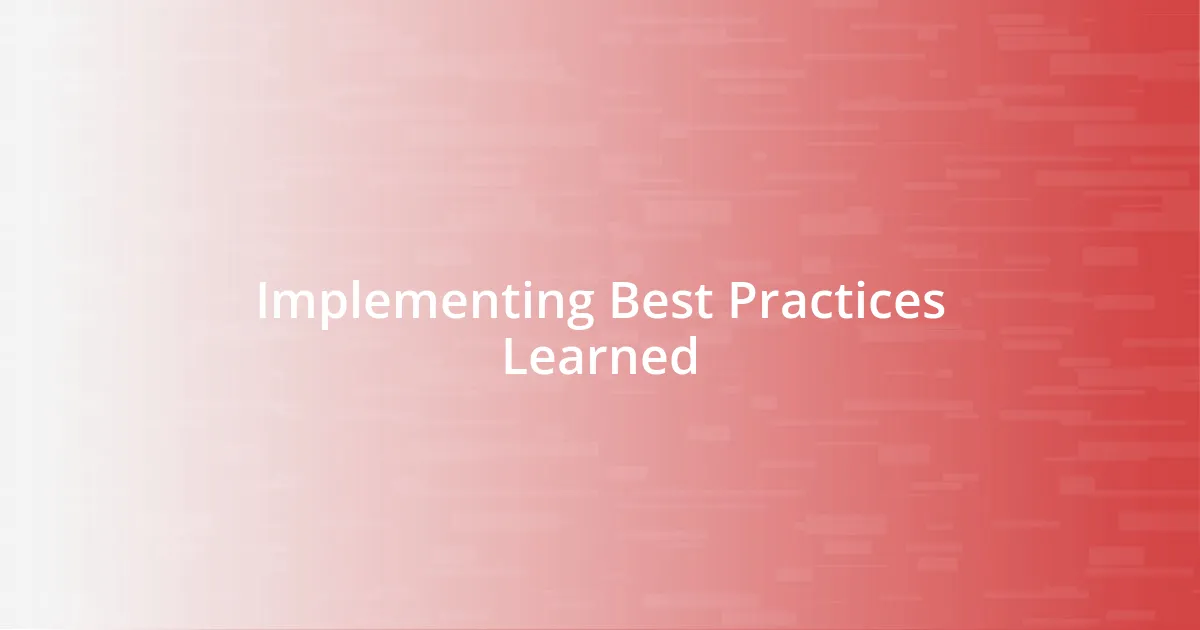
Implementing Best Practices Learned
Implementing best practices learned from workshops can truly transform the way we approach our work in the meat industry. I remember one workshop segment where we focused on the importance of utilizing data for decision-making. After that session, I felt inspired to re-evaluate our operation’s metrics. I realized I had been relying too heavily on anecdotal evidence rather than hard numbers. The shift was eye-opening; it allowed me to identify inefficiencies we could address for better productivity.
Sharing insights with fellow attendees was another game-changer. I still find it remarkable how one shared success story about implementing a feed efficiency program sparked my interest. I reached out afterward to learn more, and since then, my team and I have integrated similar practices. The effects were almost immediate—improved animal health and reduced feed costs. It left me pondering: how many additional ideas are waiting to be discovered just by conversing with others?
I also embraced sustainable packaging solutions discussed during a session. It took me back to a conversation I had with a local supplier about minimizing plastic use. Together, we brainstormed alternatives that could make a real difference. It was thrilling to see our small ideas translate into actionable strategies. When was the last time you made a decision that felt right not just for your business, but for the planet? This process invites a profound sense of responsibility, reminding us that even small changes can lead to significant impacts.
